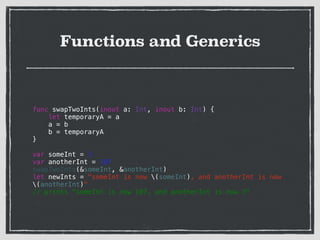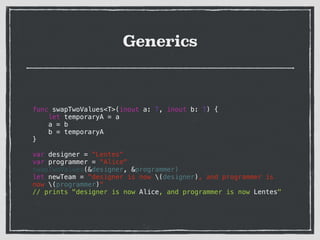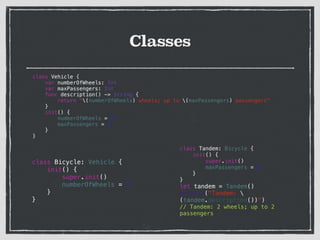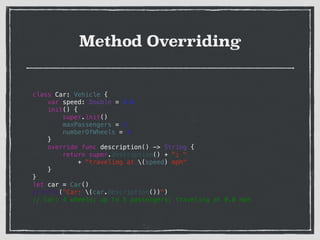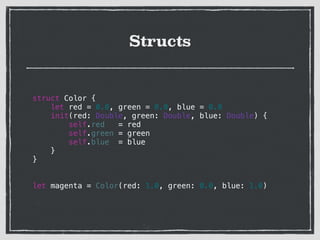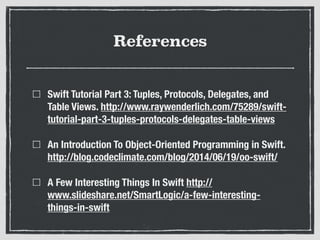This document serves as an introduction to Swift programming language, comparing it with Objective-C while covering foundational concepts such as variables, optionals, arrays, dictionaries, and control flow structures. It also delves into functions, method overriding, classes versus structures, and protocols, providing examples throughout. Additionally, it highlights some interesting facts and references relevant resources for further learning.
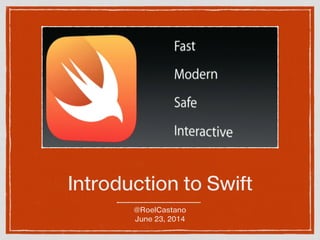





![Arrays
/*
Notes:
These arrays can only be of one types, not like
NSArray or NSDictionary, which can have any object.
*/
!
//array (String[] optional)
let emptyArray = String[]()
!
var shoppingList: String[] = ["catfish", "water", "tulips", "blue paint"] //prefered
var numberList: Array<Int> = [1,2,3,4,5]
var numberList2 = [11,22,33,44,55] //preferred
!
shoppingList.append("milk")
!
for (index, object) in enumerate(shoppingList){
println("The object #(index) is a (object)")
}
!
var possibleNames = Array(count: 10, repeatedValue: "BRO")](https://image.slidesharecdn.com/swiftpresentation-140625083404-phpapp01/85/Introduction-to-Swift-programming-language-7-320.jpg)
![Dictionaries
//dictionary
let emptyDictionary = Dictionary<String, Float>()
!
var occupations = [
"Malcolm": "Captain",
"Kaylee": "Mechanic",
]
occupations["Jayne"] = "Public Relations"
occupations.updateValue("Chief", forKey:"Malcolm")
occupations.removeValueForKey("Kaylee")
occupations
!
var employees = Array(occupations.keys)
!
for (name, occupation) in occupations
{
println("Name: (name) n Occupation: (occupation)")
}
!](https://image.slidesharecdn.com/swiftpresentation-140625083404-phpapp01/85/Introduction-to-Swift-programming-language-8-320.jpg)

![For Loop
let interestingNumbers = [
"Prime": [2, 3, 5, 7, 11, 13],
"Fibonacci": [1, 1, 2, 3, 5,
8],
"Square": [1, 4, 9, 16, 25],
]
var largest = 0
var largestKind:String? = nil
for (kind, numbers) in
interestingNumbers {
for number in numbers {
if number > largest {
largest = number
largestKind = kind
}
}
}
largest //25
largestKind //square
var firstForLoop = 0
for i in 0..3 {
firstForLoop += i
}
firstForLoop // 3
!
————————————————————————————————
!
var firstForLoop = 0
for i in 0...3 {
secondForLoop += i
}
secondForLoop // 6](https://image.slidesharecdn.com/swiftpresentation-140625083404-phpapp01/85/Introduction-to-Swift-programming-language-10-320.jpg)

